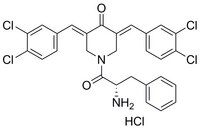530341 Sigma-AldrichRPN13 Inhibitor, RA190 - CAS 1617495-03-0 - Calbiochem
RPN13 Inhibitor, RA190, is a cell-permeable compound that binds to cysteine 88 of ubiquitin receptor RPN13 Pru domain in the 19S regulatory particle and inhibits proteasome function.
More>> RPN13 Inhibitor, RA190, is a cell-permeable compound that binds to cysteine 88 of ubiquitin receptor RPN13 Pru domain in the 19S regulatory particle and inhibits proteasome function. Less<<Synonyms: 3,5-bis(3,4-Dichlorobenzylidene)-1-(S-2-amino-3-phenyl)-piperidin-4-one, HCl, ADRM1 Inhibitor, Adhesion Regulating Molecule 1 Inhibitor, ARM1 Inhibitor; GP110 Inhibitor
Recommended Products
Áttekintés
| Replacement Information |
|---|
Kulcsspecifikációk táblázata
| CAS # | Empirical Formula |
|---|---|
| 1617495-03-0 | C₂₈H₂₂Cl₄N₂O₂ •HCl |
Products
| Katalógusszám | Csomagolás | Menny./csomag | |
|---|---|---|---|
| 5.30341.0001 | Üvegpalack | 10 mg |
| Description | |
|---|---|
| Overview | A cell-permeable, bioavailable, non-toxic bis-benzylidine piperidone compound that directly and covalently binds to Cys88 of ubiquitin receptor RPN13 Pru domain (pleckstrin-like receptor for ubiquitin) in the 19S regulatory particle and inhibits proteasome function leading to rapid accumulation of polyubiquitinated proteins. Does not affect the chymotryptic, tryptic, and peptidyl-glutamyl peptide-hydrolyzing activities of the 20S core particle. Exhibits anti-proliferative effects against multiple myeloma cells (IC50 = 100 nM) and HPV transformed cells (IC50 = 300 nM). Acts synergistically with bortezomib (Cat. No. 504314) to diminish cervical cancer cell viability and is effective even in multiple myeloma cells that are resistant to bortezomib treatment. Elevates p53 and p53-regulated genes in HeLa, CaSki, and SiHa cervical cancer cells as observed with bortezomib. Shown to induce apoptosis via induction of endoplasmic reticulum stress and up-regulate ATF-4 protein and CHOP-10 and XBP1s mRNA levels prior to apoptosis in MM.1S and HeLa cells. Reduces the growth of multiple myeloma and ovarian cancer xenografts in mice without affecting spontaneous HPV-specific CD8+ T cell responses. Displays desirable pharmacokinetic properties with Cmax in about 2 hours and t1/2α = 4.2 h; t1/2β = 25.5 h following a 10 mg/kg dose (i.p). Please note that the molecular weight for this compound is batch-specific due to variable water content. Please refer to the vial label or the certificate of analysis for the batch-specific molecular weight. The molecular weight provided represents the baseline molecular weight without water. |
| Catalogue Number | 530341 |
| Brand Family | Calbiochem® |
| Synonyms | 3,5-bis(3,4-Dichlorobenzylidene)-1-(S-2-amino-3-phenyl)-piperidin-4-one, HCl, ADRM1 Inhibitor, Adhesion Regulating Molecule 1 Inhibitor, ARM1 Inhibitor; GP110 Inhibitor |
| References | |
|---|---|
| References | Anchoori, R.K., et al. 2013. Cancer Cell. 24, 791. |
| Product Information | |
|---|---|
| CAS number | 1617495-03-0 |
| Form | Yellow solid |
| Hill Formula | C₂₈H₂₂Cl₄N₂O₂ •HCl |
| Chemical formula | C₂₈H₂₂Cl₄N₂O₂ •HCl |
| Hygroscopic | Hygroscopic |
| Reversible | N |
| Quality Level | MQ100 |
| Applications |
|---|
| Biological Information | |
|---|---|
| Primary Target | RPN13/ADRM1 |
| Purity | ≥97% by HPLC |
| Physicochemical Information | |
|---|---|
| Cell permeable | Y |
| Dimensions |
|---|
| Materials Information |
|---|
| Toxicological Information |
|---|
| Safety Information according to GHS |
|---|
| Safety Information |
|---|
| Product Usage Statements |
|---|
| Packaging Information | |
|---|---|
| Packaged under inert gas | Packaged under inert gas |
| Transport Information |
|---|
| Supplemental Information |
|---|
| Specifications |
|---|
| Global Trade Item Number | |
|---|---|
| Katalógusszám | GTIN |
| 5.30341.0001 | 04055977287295 |
Documentation
RPN13 Inhibitor, RA190 - CAS 1617495-03-0 - Calbiochem MSDS
| Title |
|---|
References
| Hivatkozások áttekintése |
|---|
| Anchoori, R.K., et al. 2013. Cancer Cell. 24, 791. |
| Data Sheet | ||||||||||||||||||||||||||||
|---|---|---|---|---|---|---|---|---|---|---|---|---|---|---|---|---|---|---|---|---|---|---|---|---|---|---|---|---|
|
Note that this data sheet is not lot-specific and is representative of the current specifications for this product. Please consult the vial label and the certificate of analysis for information on specific lots. Also note that shipping conditions may differ from storage conditions.
|







